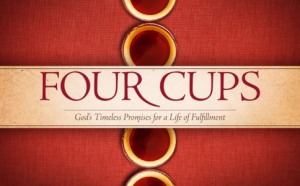Questions, questions, questions.
Did you even notice that young people pose numerous questions - often at the most inopportune times? Kids always seem to have a counter:
- “Can you go help your mom?”
- Why, what’s she need?
- Would you come in for dinner?
- Can you take out the trash?
- Now?
I think parents would like the Nike motto tattooed on the foreheads of their kids which says, “Just do it.” Less back-talk, more action.
In this week’s Gospel, the Scripture does not have the Disciples asking any questions. They seem to just do it. But there are back stories here that would elicit numerous questions from any believing Jew:
A man carrying a jar of water?
Only three cups drunk? The fourth cup not partaken of?
They sung a hymn and then left?
“This is my body; this is my blood?”
So what’s behind these items that should elicit questions?
A man carrying a jar of water.
A man carrying water was rather ridiculous in Jesus’ time. Only the women, not the men, carried water jars.
Only 3 cups drunk. The 4th cup not partaken of.
In the Passover Meal (The Seder) there were four cups of wine involved. The first cup is part of The Kiddush or Thanksgiving. This is the Cup of Sanctification. God promised that He would bring His people out from under the cruel oppression of the Egyptians.
The second cup is The Cup of Judgment or Wrath based on God’s statement, “I will deliver you from slavery to them” consumed along with the unleavened bread and bitter herbs signifying the bitterness of their slavery and the bread they had to eat while quickly leaving Egypt.
The third cup is Cup of Blessing. It celebrated the splitting of the sea, after which the Jews felt completely redeemed, without fear of the Egyptians recapturing them.
Afterwards the fourth cup of wine is drunk. The Seder concludes with a hymn of praise, a prayer that the night’s service be accepted and the hope for the Messiah is expressed.
Jesus and the Disciples only drink 3 cups. “Hey Lord, what about the 4th cup?” The reason was that “The 4th Cup” was not partaken of until on the cross when Jesus said “It is finished.”
They sing a hymn and then leave “as if” Passover was completed…but it wasn’t.
Hey Lord, we’re not finished yet. Why are we singing and leaving?
“This is my body; this is my blood.”
Remember when the followers of Jesus said, “This is a hard saying! Who can believe it?” and left? Only the Apostles stayed. Here Jesus puts a fine point on it by saying it again but the saying is no less controversial.
But no one asks anything. In fact, the total lack of questions is striking.
****************************
Do any of you have questions of God today?
Although it is not mentioned in the Scriptures, the Disciples surly had questions, but they had to wait until their questions were finally answered:
- Some directly by Christ.
- Some by the inspiration of the Holy Spirit.
- Some by St. Paul and his writings in light of his missionary journeys.
- Some through subsequent events of the early Church as recounted and written in the Scriptures.
God always answers the questions. In doing so, God always provides one of three answers:
- Yes
- Not yet
- I got a better idea.
It is difficult to answer like the Hebrews did saying, “We will do everything that the LORD has told us.” In all three answers above, God is asking for trust and belief. But we can also take comfort that God does not expect us to act like robots or slaves. We’re not slaves; we’re His sons and daughters. We have a relationship with God. We can ask questions.
But what are you going to do with the questions? So in going out today ask yourself the following:
- What’s going well? What’s my “Cup of Thanksgiving.” This is classic Ignatian and Salesian spirituality which in the Spiritual Exercises and Introduction to the Devout Life always commend the believer to start with praise and thanksgiving.
- What’s really bothering me? What is my “Cup of Wrath?” What are my “bitter herbs?” Why is this bothering me?
- What’s my “Cup of Deliverance?” In other words, from what is God trying to free me? What is God working on in my life? What do I need to work on - or better - where do I need the power of God’s “mercy” to work this deliverance in my life? What confirmation do I have that this is happening?
What do we do with this? What do we do with these questions? Actually nothing. Go and do the next best thing. Live within the question. Wait on the Lord. As you leave Mass, realize that you have been sent on a mission - to go out and find those people who also are troubled by questions and provide them with the same comfort that you have received yourself.
Audio version of the homily is here:


